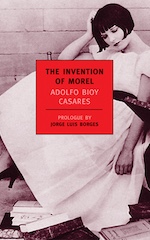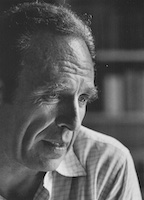 The Book Beat reading group selection for May is The Invention of Morel by Adolfo Bioy Casares. We will meet virtually online via Zoom on Wednesday, May 29 at 7 p.m. The Zoom link will be sent on the afternoon of the meeting to anyone interested in attending. Email bookbeatorders@gmail.com to sign up. The Book Beat reading group features international works in translation, and discussions are free and open to the public. Please call (248) 968-1190 for more information.
The Book Beat reading group selection for May is The Invention of Morel by Adolfo Bioy Casares. We will meet virtually online via Zoom on Wednesday, May 29 at 7 p.m. The Zoom link will be sent on the afternoon of the meeting to anyone interested in attending. Email bookbeatorders@gmail.com to sign up. The Book Beat reading group features international works in translation, and discussions are free and open to the public. Please call (248) 968-1190 for more information.
Books are now in stock and discounted 15%.
Jorge Luis Borges declared The Invention of Morel a masterpiece of plotting, comparable to The Turn of the Screw and Journey to the Center of the Earth. Set on a mysterious island, Bioy’s novella is a story of suspense and exploration, as well as a wonderfully unlikely romance, in which every detail is at once crystal clear and deeply mysterious.
Inspired by Bioy Casares’s fascination with the movie star Louise Brooks, The Invention of Morel has gone on to live a secret life of its own. Greatly admired by Julio Cortázar, Gabriel García Márquez, and Octavio Paz, the novella helped to usher in Latin American fiction’s now famous postwar boom. As the model for Alain Resnais and Alain Robbe-Grillet’s Last Year in Marienbad, it also changed the history of film.
 Adolfo Bioy Casares (1914-1999) was born in Buenos Aires, the child of wealthy parents. He began to write in the early thirties, and his stories appeared in the influential magazine Sur, through which he met his wife, the painter and writer Silvina Ocampo, as well Jorge Luis Borges, who was to become his mentor, friend, and collaborator. In 1940, after writing several novice works, Bioy published the novella The Invention of Morel, the first of his books to satisfy him, and the first in which he hit his characteristic note of uncanny and unexpectedly harrowing humor. Later publications include stories and novels, among them A Plan for Escape, A Dream of Heroes, and Asleep in the Sun. Bioy also collaborated with Borges on an Anthology of Fantastic Literature and a series of satirical sketches written under the pseudonym of H. Bustos Domecq.
Adolfo Bioy Casares (1914-1999) was born in Buenos Aires, the child of wealthy parents. He began to write in the early thirties, and his stories appeared in the influential magazine Sur, through which he met his wife, the painter and writer Silvina Ocampo, as well Jorge Luis Borges, who was to become his mentor, friend, and collaborator. In 1940, after writing several novice works, Bioy published the novella The Invention of Morel, the first of his books to satisfy him, and the first in which he hit his characteristic note of uncanny and unexpectedly harrowing humor. Later publications include stories and novels, among them A Plan for Escape, A Dream of Heroes, and Asleep in the Sun. Bioy also collaborated with Borges on an Anthology of Fantastic Literature and a series of satirical sketches written under the pseudonym of H. Bustos Domecq.
